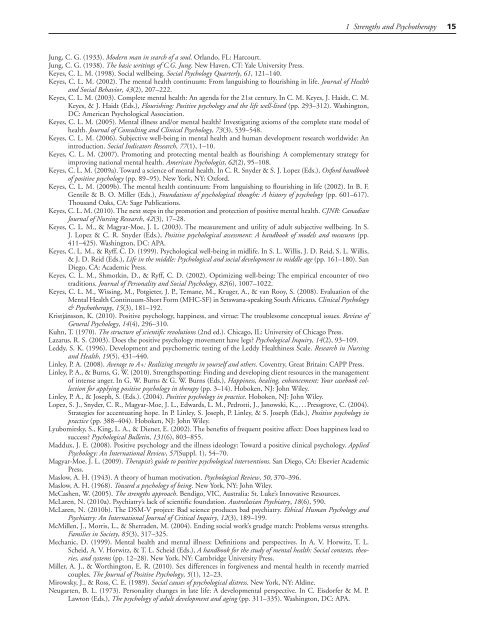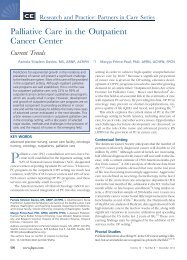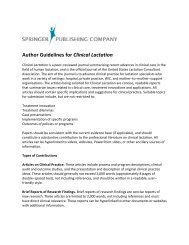Tools for Strengths-Based Assessment and Evaluation - Springer ...
Tools for Strengths-Based Assessment and Evaluation - Springer ...
Tools for Strengths-Based Assessment and Evaluation - Springer ...
You also want an ePaper? Increase the reach of your titles
YUMPU automatically turns print PDFs into web optimized ePapers that Google loves.
Jung, C. G. (1933). Modern man in search of a soul. Orl<strong>and</strong>o, FL: Harcourt.<br />
Jung, C. G. (1938). The basic writings of C.G. Jung. New Haven, CT: Yale University Press.<br />
Keyes, C. L. M. (1998). Social wellbeing. Social Psychology Quarterly, 61, 121–140.<br />
Keyes, C. L. M. (2002). The mental health continuum: From languishing to flourishing in life. Journal of Health<br />
<strong>and</strong> Social Behavior, 43(2), 207–222.<br />
Keyes, C. L. M. (2003). Complete mental health: An agenda <strong>for</strong> the 21st century. In C. M. Keyes, J. Haidt, C. M.<br />
Keyes, & J. Haidt (Eds.), Flourishing: Positive psychology <strong>and</strong> the life well-lived (pp. 293–312). Washington,<br />
DC: American Psychological Association.<br />
Keyes, C. L. M. (2005). Mental illness <strong>and</strong>/or mental health? Investigating axioms of the complete state model of<br />
health. Journal of Consulting <strong>and</strong> Clinical Psychology, 73(3), 539–548.<br />
Keyes, C. L. M. (2006). Subjective well-being in mental health <strong>and</strong> human development research worldwide: An<br />
introduction. Social Indicators Research, 77(1), 1–10.<br />
Keyes, C. L. M. (2007). Promoting <strong>and</strong> protecting mental health as flourishing: A complementary strategy <strong>for</strong><br />
improving national mental health. American Psychologist, 62(2), 95–108.<br />
Keyes, C. L. M. (2009a). Toward a science of mental health. In C. R. Snyder & S. J. Lopez (Eds.), Ox<strong>for</strong>d h<strong>and</strong>book<br />
of positive psychology (pp. 89–95). New York, NY: Ox<strong>for</strong>d.<br />
Keyes, C. L. M. (2009b). The mental health continuum: From languishing to flourishing in life (2002). In B. F.<br />
Gentile & B. O. Miller (Eds.), Foundations of psychological thought: A history of psychology (pp. 601–617).<br />
Thous<strong>and</strong> Oaks, CA: Sage Publications.<br />
Keyes, C. L. M. (2010). The next steps in the promotion <strong>and</strong> protection of positive mental health. CJNR: Canadian<br />
Journal of Nursing Research, 42(3), 17–28.<br />
Keyes, C. L. M., & Magyar-Moe, J. L. (2003). The measurement <strong>and</strong> utility of adult subjective wellbeing. In S.<br />
J. Lopez & C. R. Snyder (Eds.), Positive psychological assessment: A h<strong>and</strong>book of models <strong>and</strong> measures (pp.<br />
411–425). Washington, DC: APA.<br />
Keyes, C. L. M., & Ryff, C. D. (1999). Psychological well-being in midlife. In S. L. Willis, J. D. Reid, S. L. Willis,<br />
& J. D. Reid (Eds.), Life in the middle: Psychological <strong>and</strong> social development in middle age (pp. 161–180). San<br />
Diego, CA: Academic Press.<br />
Keyes, C. L. M., Shmotkin, D., & Ryff, C. D. (2002). Optimizing well-being: The empirical encounter of two<br />
traditions. Journal of Personality <strong>and</strong> Social Psychology, 82(6), 1007–1022.<br />
Keyes, C. L. M., Wissing, M., Potgieter, J. P., Temane, M., Kruger, A., & van Rooy, S. (2008). <strong>Evaluation</strong> of the<br />
Mental Health Continuum-Short Form (MHC-SF) in Setswana-speaking South Africans. Clinical Psychology<br />
& Psychotherapy, 15(3), 181–192.<br />
Kristjánsson, K. (2010). Positive psychology, happiness, <strong>and</strong> virtue: The troublesome conceptual issues. Review of<br />
General Psychology, 14(4), 296–310.<br />
Kuhn, T. (1970). The structure of scientific revolutions (2nd ed.). Chicago, IL: University of Chicago Press.<br />
Lazarus, R. S. (2003). Does the positive psychology movement have legs? Psychological Inquiry, 14(2), 93–109.<br />
Leddy, S. K. (1996). Development <strong>and</strong> psychometric testing of the Leddy Healthiness Scale. Research in Nursing<br />
<strong>and</strong> Health, 19(5), 431–440.<br />
Linley, P. A. (2008). Average to A+: Realizing strengths in yourself <strong>and</strong> others. Coventry, Great Britain: CAPP Press.<br />
Linley, P. A., & Burns, G. W. (2010). <strong>Strengths</strong>potting: Finding <strong>and</strong> developing client resources in the management<br />
of intense anger. In G. W. Burns & G. W. Burns (Eds.), Happiness, healing, enhancement: Your casebook collection<br />
<strong>for</strong> applying positive psychology in therapy (pp. 3–14). Hoboken, NJ: John Wiley.<br />
Linley, P. A., & Joseph, S. (Eds.). (2004). Positive psychology in practice. Hoboken, NJ: John Wiley.<br />
Lopez, S. J., Snyder, C. R., Magyar-Moe, J. L., Edwards, L. M., Pedrotti, J., Janowski, K., . . . Pressgrove, C. (2004).<br />
Strategies <strong>for</strong> accentuating hope. In P. Linley, S. Joseph, P. Linley, & S. Joseph (Eds.), Positive psychology in<br />
practice (pp. 388–404). Hoboken, NJ: John Wiley.<br />
Lyubomirsky, S., King, L. A., & Diener, E. (2002). The benefits of frequent positive affect: Does happiness lead to<br />
success? Psychological Bulletin, 131(6), 803–855.<br />
Maddux, J. E. (2008). Positive psychology <strong>and</strong> the illness ideology: Toward a positive clinical psychology. Applied<br />
Psychology: An International Review, 57(Suppl. 1), 54–70.<br />
Magyar-Moe, J. L. (2009). Therapist’s guide to positive psychological interventions. San Diego, CA: Elsevier Academic<br />
Press.<br />
Maslow, A. H. (1943). A theory of human motivation. Psychological Review, 50, 370–396.<br />
Maslow, A. H. (1968). Toward a psychology of being. New York, NY: John Wiley.<br />
McCashen, W. (2005). The strengths approach. Bendigo, VIC, Australia: St. Luke’s Innovative Resources.<br />
McLaren, N. (2010a). Psychiatry’s lack of scientific foundation. Australasian Psychiatry, 18(6), 590.<br />
McLaren, N. (2010b). The DSM-V project: Bad science produces bad psychiatry. Ethical Human Psychology <strong>and</strong><br />
Psychiatry: An International Journal of Critical Inquiry, 12(3), 189–199.<br />
McMillen, J., Morris, L., & Sherraden, M. (2004). Ending social work’s grudge match: Problems versus strengths.<br />
Families in Society, 85(3), 317–325.<br />
Mechanic, D. (1999). Mental health <strong>and</strong> mental illness: Definitions <strong>and</strong> perspectives. In A. V. Horwitz, T. L.<br />
Scheid, A. V. Horwitz, & T. L. Scheid (Eds.), A h<strong>and</strong>book <strong>for</strong> the study of mental health: Social contexts, theories,<br />
<strong>and</strong> systems (pp. 12–28). New York, NY: Cambridge University Press.<br />
Miller, A. J., & Worthington, E. R. (2010). Sex differences in <strong>for</strong>giveness <strong>and</strong> mental health in recently married<br />
couples. The Journal of Positive Psychology, 5(1), 12–23.<br />
Mirowsky, J., & Ross, C. E. (1989). Social causes of psychological distress. New York, NY: Aldine.<br />
Neugarten, B. L. (1973). Personality changes in late life: A developmental perspective. In C. Eisdorfer & M. P.<br />
Lawton (Eds.), The psychology of adult development <strong>and</strong> aging (pp. 311–335). Washington, DC: APA.<br />
1 <strong>Strengths</strong> <strong>and</strong> Psychotherapy 15

















